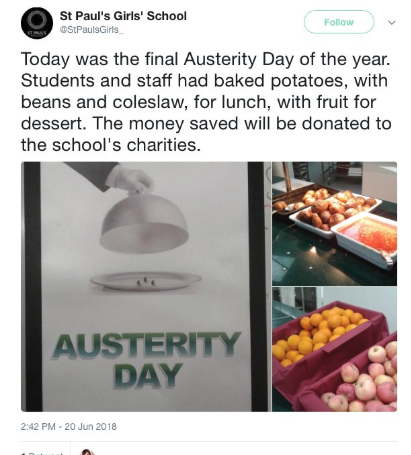
“Today,” begins a rather ill-considered tweet that St Paul’s Girls’ School sent on Wednesday, “was the final Austerity Day of the year. Students and staff had baked potatoes, with beans and coleslaw, for lunch, with fruit for dessert.”
In other words, in an attempt to show the privileged young women of west London how the other half lives, their school was providing them with what would, in many cafes or work canteens around the world, be termed, simply, “lunch”. There are hedge fund managers with hangovers who would consider a large slab of slightly damp carbs a perfectly serviceable midday meal. “The money saved will be donated to the school’s charities.” Well that’s alright, then.

The picture of three peas on a silver platter is a nice touch.
Screenshots of the tweet in question are now doing the rounds. But the original is no longer extant – somebody seems to have noticed it was Not A Good Look – and the 24-follower account that sent it has existed for slightly under a week. There was thus some excitement on the New Statesman web desk as we scrambled to work out whether it was real at all. The hold music on the school’s phone system, incidentally, is “I Vow To Thee My Country”.
This article from the school paper, however, in which ten girls describe their school meal of choice, however, seems to confirm it. “My favourite school lunch is the austerity lunch,” says one, “because it always reminds me how we can save money and food when so many others in the world are going hungry.” It also, one imagines, reminders her of how tasty delicious, saucy carbs can be.
I don’t want to go in too hard on this thing, for all sorts of reasons. First there’s a significant danger of hypocrisy here, because I am, I’m afraid, one of the seven per cent of the population that went to a private school. The school in question was in the centre of what is now TOWIE territory, and so had a rather different social mix to St Paul’s: its most famous products from my era included Frank Lampard and Jodie Marsh. But at the point that you’re arguing that your own hive of privilege is not actually as posh as some other hives of privilege, you should probably shut the fuck up.
Another reason I want to be careful here: this seems to come from a good place. Reminding privileged kids that they’re privileged is A Good Thing. So is sending money to charity: according to its website, St Paul’s Girls’ picks two chosen charities each year, and holds all sorts of concerts, fashion shows and sponsored swims to raise money for them. The British ruling class can often be ghastly, grasping and selfish. This is not an example of that, and while noblesse oblige risks looking patronising it’s a hell of a lot better than the alternatives.
Yet, all the same, the idea of a private girls’ school holding regular Austerity Days just feels gross. Private education these days, after all, costs a staggering amount. Fees have continued to spiral, in exactly the way that wages – even wages at the upper end – haven’t, and where once private school was an option for the well-to-do-and-pretentious it’s now restricted to the mega-rich. At St Paul’s Girls’ itself, fees for the current academic year are £7,978 per term, or just shy of £24,000 a year. (UK-wide, the median disposable income per household is only around £27,000.) This price includes lunch and personal accident insurance, you’ll be pleased to hear, but textbooks and so forth are extra.
Not every student pays, of course: some are on bursaries, paid for in part by the money raised from those concerts, fashion shows and sponsored swims. The charities the school raises money for includes itself. Even so, many of the school’s pupils are drawn from a section of society to which austerity is simply not a meaningful concept. Even leaving aside the fact the austerity lunch is not in fact that austere, it is vastly easier to live cheap for one day than to contend with having to do it every day for the foreseeable future. Have the Paulinas never listened to the lyrics of Common People?
David Cameron was widely mocked last year for a sign in his kitchen, reading “Calm down, dear, it’s only a recession”. The words were apparently meant to communicate what a relaxed kind of a guy he is, but instead served mainly to highlight the fact he would never have to get to grips with exactly why recessions are bad. Austerity lunch, however well-intentioned, does much the same thing. It suggests that the real problem faced by the under-privileged is that their lunch might be a bit bland. It suggests austerity is not really that big a deal.
But to many families who aren’t spending £24,000 a year on school fees, plus text books and music lessons, austerity is rather a big deal, actually. St Paul’s Girls’ School may genuinely wish to inspire empathy for the less well-off; but in the way it’s chosen to do it, there’s a very real danger it might do the opposite.




